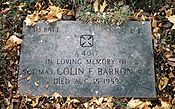
Colin Fraser Barron
Encyclopedia

Victoria Cross
The Victoria Cross is the highest military decoration awarded for valour "in the face of the enemy" to members of the armed forces of various Commonwealth countries, and previous British Empire territories....
(20 September 1893 – 15 August 1958) was a Canadian
Canada
Canada is a North American country consisting of ten provinces and three territories. Located in the northern part of the continent, it extends from the Atlantic Ocean in the east to the Pacific Ocean in the west, and northward into the Arctic Ocean...
recipient of the Victoria Cross
Victoria Cross
The Victoria Cross is the highest military decoration awarded for valour "in the face of the enemy" to members of the armed forces of various Commonwealth countries, and previous British Empire territories....
, the highest and most prestigious award for gallantry in the face of the enemy that can be awarded to British
United Kingdom
The United Kingdom of Great Britain and Northern IrelandIn the United Kingdom and Dependencies, other languages have been officially recognised as legitimate autochthonous languages under the European Charter for Regional or Minority Languages...
and Commonwealth
Commonwealth of Nations
The Commonwealth of Nations, normally referred to as the Commonwealth and formerly known as the British Commonwealth, is an intergovernmental organisation of fifty-four independent member states...
forces.
Barron was 24 years old, and a Corporal
Corporal
Corporal is a rank in use in some form by most militaries and by some police forces or other uniformed organizations. It is usually equivalent to NATO Rank Code OR-4....
in the 3rd (Toronto) Bn., Canadian Expeditionary Force
Canadian Expeditionary Force
The Canadian Expeditionary Force was the designation of the field force created by Canada for service overseas in the First World War. Units of the C.E.F. were divided into field formation in France, where they were organized first into separate divisions and later joined together into a single...
during the First World War
World War I
World War I , which was predominantly called the World War or the Great War from its occurrence until 1939, and the First World War or World War I thereafter, was a major war centred in Europe that began on 28 July 1914 and lasted until 11 November 1918...
when he was awarded the Victoria Cross.
Action

Belgium
Belgium , officially the Kingdom of Belgium, is a federal state in Western Europe. It is a founding member of the European Union and hosts the EU's headquarters, and those of several other major international organisations such as NATO.Belgium is also a member of, or affiliated to, many...
, when his unit was held up by three machine-guns, Corporal Barron opened fire on them at point-blank range, rushed the guns, killed four of the crew and captured the remainder. He then turned one of the captured guns on the retiring enemy, causing severe casualties. This action produced far-reaching results and enabled the advance to continue.
He was born in Baldavie, Boyndie, Banffshire
Banffshire
The County of Banff is a registration county for property, and Banffshire is a Lieutenancy area of Scotland.The County of Banff, also known as Banffshire, was a local government county of Scotland with its own county council between 1890 and 1975. The county town was Banff although the largest...
, Scotland
Scotland
Scotland is a country that is part of the United Kingdom. Occupying the northern third of the island of Great Britain, it shares a border with England to the south and is bounded by the North Sea to the east, the Atlantic Ocean to the north and west, and the North Channel and Irish Sea to the...
, a son of Margaret Walker Barron, a domestic servant. He was raised in a large household by his grandparents Joseph Barron & Mary Reid along with his brother Alexander Barron and many other half-siblings and aunts and uncles. Colin Fraser Barron is also considered Scottish. He later achieved the rank of sergeant
Sergeant
Sergeant is a rank used in some form by most militaries, police forces, and other uniformed organizations around the world. Its origins are the Latin serviens, "one who serves", through the French term Sergent....
. Grave/memorial at Buried at Prospect Cemetery, Toronto, Ontario, Canada. Veteran's Section 7. Grave 3562.

